The Organisation of Petroleum Exporting Countries (OPEC) on Sunday agreed to maintain its planned monthly oil output, as the European Union agreed to impose a price cap on Russian oil.
OPEC disclosed this at its 34th OPEC and non-OPEC ministerial meeting, according to a statement released by the organisation on Sunday.
The oil cartel noted that its decision was in adherence to the approach of being proactive and preemptive.
The development came days after the European Union announced it had reached a consensus to cap the price of Russian oil at $60 per barrel.
In October, OPEC agreed to cut oil output by 2 million barrels per day in November. It’s the deepest cut by OPEC+ since the 2020 COVID pandemic disrupted the global economy. Its decision comes despite pressure from the United States and others for the group to pump more.
On Friday, the G7 nations, the European Union and Australia agreed to impose a price cap of $60 a barrel on Russian oil shipped to other countries that have not adopted an embargo.
“The EU agreement on an oil price cap, coordinated with G7 and others, will reduce Russia’s revenues significantly. It will help us stabilize global energy prices, benefitting emerging economies around the world,” Ursula von der Leyen, the president of the European Commission said in a tweet on Friday.
On Sunday, OPEC said it decided to reaffirm the decision of the 10th OPEC and non-OPEC Ministerial Meeting on 12 April 2020 and further endorse it in subsequent meetings, including the 19th OPEC and non-OPEC Ministerial Meeting on 18 July 2021 and the 33rd OPEC and non-OPEC Ministerial Meeting on 5 October 2022.
“In line with the decision of the OPEC which was purely driven by market considerations and recognized in retrospect by the market participants to have been the necessary and the right course of action towards stabilizing global oil markets; and adhering to the approach of being proactive and preemptive, the Participating Countries reiterated their readiness to meet at any time and take immediate additional measures to address market developments and support the balance of the oil market and its stability if necessary.
“Reiterate the critical importance of adhering to full conformity and compensation mechanism taking advantage of the extension approved at the 33rd OPEC and non-OPEC Ministerial Meeting,” it said.
The new developments come amid uncertainties created in the global oil market by the Russia-Ukraine war, which affected oil prices and global trade.
Nigeria has for months failed to meet higher quota due to massive oil theft and other production challenges.
With an average of 1,083,899 barrels per day in July, Nigeria’s crude oil production plunged below one million barrels per day (972, 394 bpd) in August, the lowest ever in several years.
In October, the country’s production improved to 1.014 million barrels per day, according to data from Nigerian Upstream Petroleum Regulatory Commission (NUPRC).
Business News of Monday, 5 December 2022
Source: www.premiumtimesng.com













